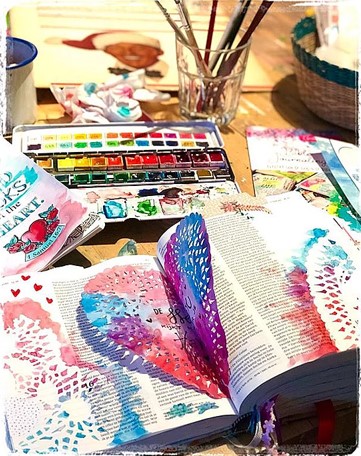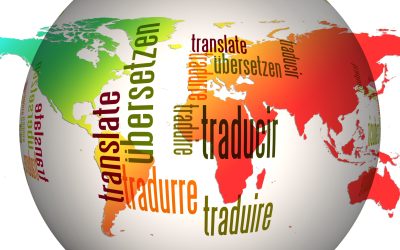More than a year and a half ago, I once highlighted new releases in the Reading and Listening Guide (Summer 2017) (see here). Also included was a "Biblejournaling" workbook, in which you could practice decorating your Bible as a sort of "processing" of what you had read. I was very brief about it at the time, but also very dismissive about it and felt that it was not a good way to deal with the Bible.
The phenomenon has since expanded quite a bit. There are a few sites in the Dutch language area that specifically focus on Bible journaling (see e.g here and here) and there is even a wholesaler that sells materials for Bible journaling (see here). Apparently it is also good for turnover.
So it's time to take a closer look at it now.
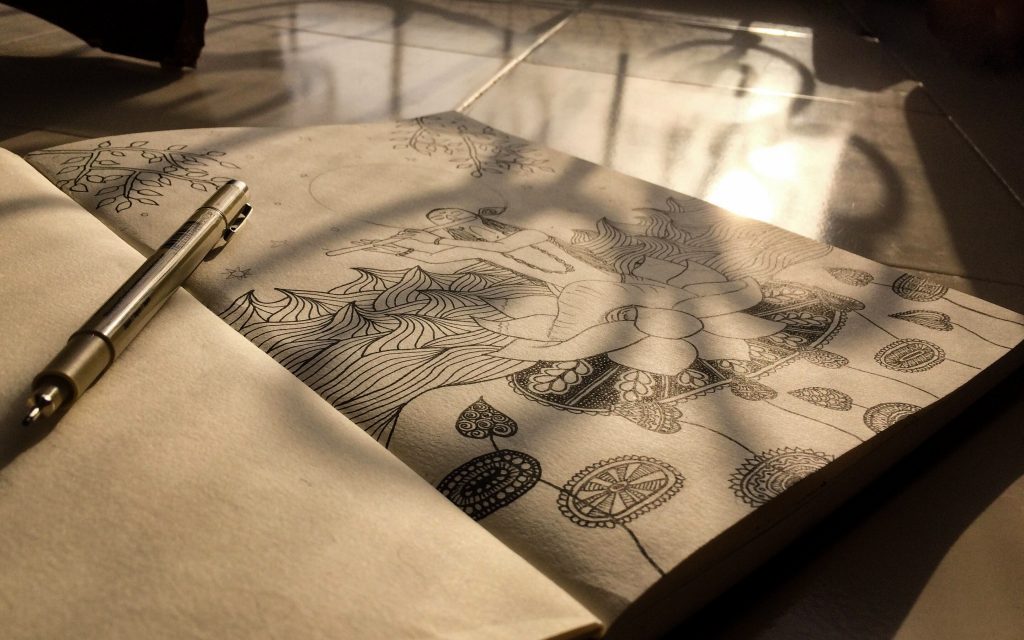
What is 'Bible Journaling'?
There is no good Dutch word for it. That's why we stick to the English term 'Biblejournaling'. In short, it is decorating your bible with drawings, texts and other ornaments when you read the bible; during your 'quiet time' so to speak. It is a special way of dealing with the Bible and it is seen as a kind of 'processing' of the Bible text.
In bookstores you can buy all kinds of special Bibles and materials for "journaling," and there are a few Dutch websites specifically about Biblejournaling. On this is some information about what it is and how to do it. About what it is they themselves say among other things the following (bold from me).
- “Bible journaling is a great way to share Bible texts experience and store them in your mind (...)" (see here)
- “Biblejournaling is a way of dealing with the Bible, the word of God. You can use the Bible to fill your bookcase, you can read in it and you can do it experienced. I think that Bible journaling is in between the latter two: it is not just about reading what is in the Bible, you are to read and experience in a particular, special way. You are working on what exactly is written in a different way.” (see here).
Just a few notes first
It is striking that youexperience the Bible text and read and experience it in a special way'. Apparently I miss something important when I read the Bible without journaling. Of course it doesn't say that and it will never be said that way, but the suggestion is there. But aren't we enough with the Bible, God's Word? Do we really need BibleJournaling to 'live or experience something special'?
Nowhere in Scripture is there any indication that there are certain ways to read the Bible "better. Or that there are methods you should apply in Bible reading should employ to gain 'more' insight; no Biblejournaling, no Lectio Divina or whatever.
Yes, but - I read somewhere - you have to compare it to what you used to do at children's club or Sunday school, when we were given worksheets to accompany the Bible story that was told. Those works were also meant to help us remember history better. That's a point; children probably remember probably remember better what was told from the Bible that way. But when you adult, do you still need something like that? Paul has the childlike laid aside; "When I was a child I spoke like a child, I thought like a child, I reasoned like a child, but now that I have become a man I have undone the childishness.” (1 Corinthians 13:11). The Bible itself calls us to mature with the Word of God[1] that is, we must think about it in order to receive understanding from the Lord (2 Timothy 2:7).
Do you never write anything down yourself? Yes, I always have a pencil and pen in my bible. With the pencil I make underlining of words or sentences, text references or meanings of names. Those kind of things. Not to have a special experience, but to be able to be reminded of it later.

Innocent needlework?
Someone called it 'creative crafts for Christian women', but the question is whether it is really so innocent. In my 'succinct review' of Biblejournaling in the summer of 2017, I very quickly put it in the same category as 'adult coloring' and 'mandalas drawing'. Things where your (self) awareness changes and your feeling is changed in a positive sense. If so, then it's not innocent.
So I went looking for the phenomenon of journaling and while searching I came across a lot of related ways to be so-called 'creative'. Writing, journaling, handlettering, art-journaling are just a few concepts that you may come across. The outward form is different, but the common thing is that to put it simply 'clear your head and relax'. Some even call it drawing very explicitly'a way to get into a meditative state'.
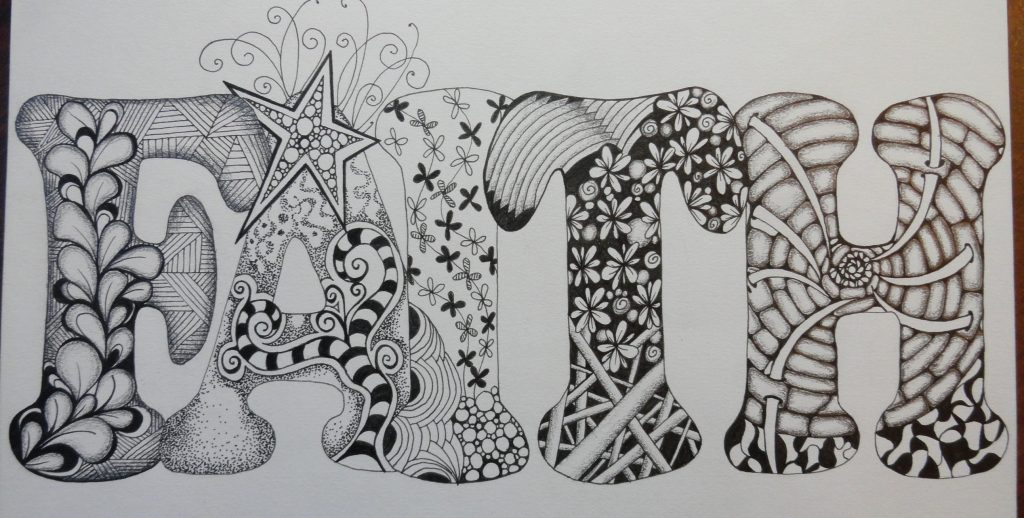
A row of quotes
What people in the world are saying about all these creative expressions can be illustrated with the quotes below (vet mine).
"What I discovered was that the practice of mindfulness meditation same responses evoked in me as
signs."
(Source: https://www.mindful.org/the-mindfulness-of-drawing/)
“Just write down your thoughts or write down what happened during the day. According to the latest studies, it is an easy way to manage stress, improve creativity, to increase happiness, improve health and improve work performance. (…) because it's you self-awareness increases."
(Journaling; source: https://zapier.com/blog/best-journaling-apps/)
“With journaling you can send your worrying head on a retreat for a while. It teaches you to step out of that narrow tunnel of thinking and doing. (…) Instead of getting lost in worrying about nothing, you write everything what comes into your head. Without the need for any storyline at all.”
(Journaling; source: https://reflectiesite.nl/journaling/#.XH-SmohKiUk))
“A nice creative indulgence book, and it helps too!(…). And while you're doing this your paper is getting full and your head getting emptier.”
(Source: From your head into your heart. https://www.ont-moetjezelf.nl/workshop-en-events/181-2/. The whole context is spiritual/new-age.)
“Drawing is a wonderful way to in meditation to pass over; into presence (presence), flow,
creation and stillness of spirit (...)"
(Source: https://www.facebook.com/events/254726128594704/)
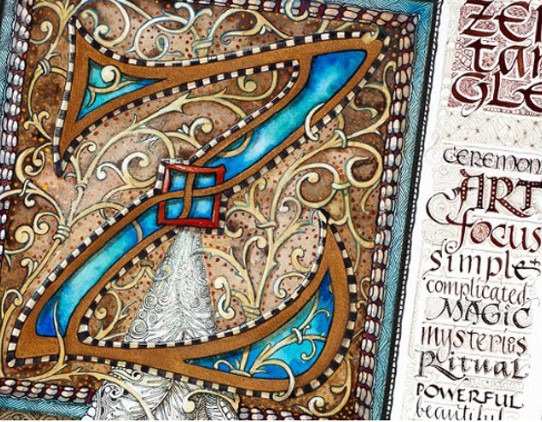
About Zentangle, a special way of drawing, you can find a lot that points to a clear relationship between drawing as an activity and the meditative state. The way in which it was 'discovered' is also different. I'll give just a few short quotes here:
"Maria described feelings of selflessness, timelessness,
effortlessness and a rich immersion in what she was doing (drawing patterns
TdJ) - all classic aspects of a flow state. Rick, who had practiced meditation for years, said what you are describing is meditation.”
(Source https://zentangle.com/pages/how-did-zentangle-begin)
“As complicated as Zentangles seem, they are easy to draw with simple, repeating lines. In this way it is possible to relax with attention create beautiful abstract art.”
(Source: https://www.writersplaza.nl/c-1429776/wat-is-zentangle-tekenen/)
“(…) It is said that the exercise de focus increases, anxiety decreases, meditation helps and creativity taps. (…) Our minds can be quite busy. With Zentangle the mind starts by itself Calm to become and does he go into a meditative state. (…) For me it is a form of prayer. It can touch me deep inside and I feel me very close to God. (…) . In the past, Zen Buddhist monks used it drawing as a form of meditation.”
(Source: https://adorers.org/focus-and-relax-the-mind-with-zentangle/)
What strikes
Of course I am not doing any 'scientific research' here, just a simple listing of some quotes. They are all about drawing in admittedly different forms, but what they have in common is that it consists of what I call 'fine drawing', where you need all your attention and to 'focus' so to speak.
The other common point is that they all have an effect on what goes on in your head. The result is peace in your head, an empty head, flow, a meditative state. Everyone calls it a little differently, but there's no question:
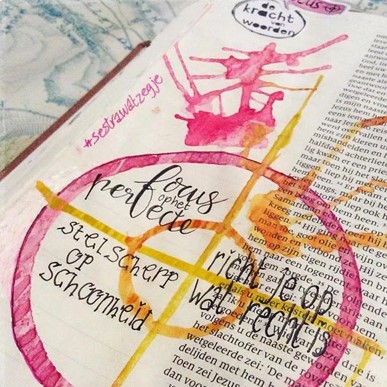
You're not making that up, are you?
Fine drawing as a way to transition into meditation!
This is not something I'm making up, but what the people of the world themselves are saying; just look at the quotes above. It makes them feel good and brings them "happy moments" or even a "blissful state" without most realizing that they have opened up to the powers in the unseen world.
The Bible warns
The people of Israel
In the Bible, God warns His people Israel that they should not approach Him – that also means not come into contact with Him – in the way that the nations (the Gentiles) make contact with their gods, which are the demons in the invisible world. In Deuteronomy 12:4 and 31 it is clearly stated:
“You shall not do as they do before the Lord your God!”
If you read the context, all of chapter 12, you will see how God wants His people to draw near to Him. In everything as He wills. Only at the place He chooses (verse 5), not according to their own ideas (verse 8) and only at the place where the burnt offerings are offered (verse 14). But at the end of the chapter, He also warns of the great danger that they might fall into the devil's snare.
“(…) beware then, lest after they be swept from before your eyes, you fall into the same snare, and that you ask not after their gods, saying, As these nations have served their gods, so shall you i do it too. You shall not do as they do before the LORD your God! For all that is an abomination to the LORD, which he hates, they have done to their gods. For they have burned even their sons and their daughters with fire for their gods. All this which I command you, you must observe carefully. You can't add anything to it and you can't take anything away from it.” (Deuteronomy 12:30-32)
If they were to serve God as the nations have served their gods, in reality they would not serve God, but the gods of the nations. Without realizing it, they would turn from the Lord and worship idols. For example, it is also stated in the following verses.
“They are no longer allowed to bring their offerings to the demons, after whom they go after as if in fornication. This is an eternal ordinance to them through all their generations.” (Leviticus 17:7)
“Let no man or woman, family, or tribe be among you that turneth his heart this day from the LORD our God, to go and serve the gods of these nations. (…).” (Deuteronomy 29:18).
“They sacrificed to the demons, not to God; to gods they knew not, to new gods that have recently come, at whom your fathers did not tremble. (…) They have made Me jealous of what is not God; they have provoked me to wrath with their vain idols.”
(Deuteronomy 32:17, 21)[2]
The Christians
Throughout her existence, for the people of Israel the temptation was and is to serving God and approaching Him in a pagan manner. An abomination to God which incurs His wrath.
But the danger is just as great for Christians. To the Christians in Corinth - a city full of paganism - Paul writes extensively about idolatry and what it has to do with it in chapters 8 to 11. He takes what happened to Israel as a terrible example for the Christians in Corinth and therefore also for the Christians. of today. In chapter 10, for example, he writes the following things.
“And these things happened when examples for usthat we should not long for evil things, as they also have longed. And don't become idolaters as some of them, as it is written: The people sat down to eat and drink, and they arose to feast. (…) All these things now are happen to them as examples for us, and they are described to warning for uson whom the end of the ages has come. (…) Therefore, my beloved, flee from idolatry. (…) What am I saying with this? That an idol is anything, or that an idol sacrifice is anything? No, I say this because what the heathen sacrifice, they do sacrifice to demons and not to God, and I don't want you to have intercourse with the demons.”
(1 Corinthians 10:6-7, 11,14, 19,20)
Paul's conclusion is the same as that of Moses: when we approach God in a pagan way, we come to the idols, the demons, and you experience and experience their influence.
At the end of his first letter, the Apostle John warns “Dear children, beware of idols.(1 John 5:21).
There could be a lot more to say about it, but due to the length of this post I'll leave it at this[3].
The trap
Do it in a different way
Not surprisingly, Satan uses all his tricks to persuade Christians to use pagan methods. But of course he doesn't get us into yoga, NLP, reiki or mindfulness, just to name a few. So we don't think it will go that fast. Well, then he comes up with something different and suggests that we seek God in a slightly different way and experience more of God in a slightly different way. Read the bible in a different way, why not, it is special. And so we don't notice that we're walking into the snare he has set.
Well, you may find that I see it all a bit black. It's pretty harmless, isn't it, that signs in your bible? Now, I wish it were, but I think that's a huge mistake, and I deduce that from the way the Bible talks about idolatry. In all tonalities the Lord God swears that His people must not get involved in it. Everything that reminded of the idolatry practiced by the nations in the land of Canaan had to be removed and destroyed. The names of the idols were not even allowed to be mentioned in Israel (see Exodus 23:13, 24; also Deuteronomy 12:2 and 3). Everything to prevent Israel from going down the path of idolatry.
Also for Paul, idolatry is something we really should stay away from, although it sometimes seems exaggerated. When a brother is tempted by my conduct to fall into idolatry, I am counted as a 'sin against Christ' (1 Corinthians 8:9-13). Drawing pictures in my bible can be neutral for me in the sense that it doesn't affect me and I'm insensitive to it. But for my sister – who is much more sensitive to it ('a weak consciousness' Paul mentions this in 1 Corinthians 8:10) - it could be very different and she could end up in idolatry because of my example. For Paul that is the reason that he does not want to make use of his rights.
Very short
In summary, you could say that as believers who love and follow the Lord Jesus, we should do so in a sober way, using our full mind. Thus we read the Scriptures, thus we sing, thus we pray, praise and give thanks. We should not try to experience God and apply the methods and ways the world uses to move into a higher state of consciousness and experience the supernatural.
Then this
We have already quoted from and referred to the book of Deuteronomy, in which the Lord so emphatically warns against idolatry. But it is remarkable that in this same book of Deuteronomy the Lord also tells them many times how they should serve Him. On the one hand, serious warnings, but He actually says: 'you don't need that at all if you serve Me in the way I indicate'.

In Deuteronomy you will find described in various chapters that
- the Lord will designate a place in the land where He will put His name
- that place is the only place where they may approach Him with their sacrifices,
- and they must do so with joy (the word 'rejoice' occurs several times in Deuteronomy)
For example, the idea is found in Deuteronomy 12:5-7 and other places.
“But to the place that the LORDyour God, out of all your tribes shall choose to put His Name there, to His home you must ask and come there. You must go there bring your burnt offerings, your sacrifices, your tithes, the heave offerings of your hand, your vowed offerings, your freewill offerings, and the firstborn of your herds and of your flocks. And there you have to before the LORD, your God, eat and delight you, you and your families, for all that you have taken up, and in which the LORD your God has blessed you.”
This can mean nothing to us Christians than the assignment
- to be church as He wishes ('you must ask for His dwelling')
- where Christ the Crucified is the center ('He establishes His Name')
- all our sacrifices of praise and thanksgiving pertain to what He accomplished on the cross of Calvary ('thither shalt thou bring thy burnt offerings, thy sacrifices…')
Perfect joy
Then great joy will fill our hearts, when the Lord Jesus Christ is the object of our hearts. Personal, but also communal. Thus we can rejoice before God, when we come to Him as He has indicated in His Word.
Then we have
'fellowship with the Father and with the Son (...) so that your joy may be complete'
(1 John 1:3,4)
[1] 'the perfect' from verse 10 refers to the complete Scriptures.
[2] The book of Deuteronomy is pre-eminently the book in which God constantly calls His people not to serve the gods. It is interesting to check or count how often (the) 'gods' are mentioned.
[3] For more information see elsewhere on this site.
